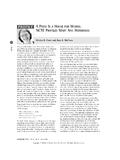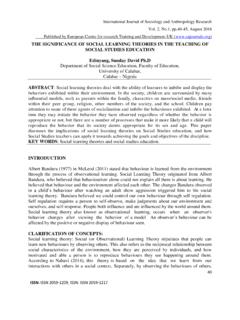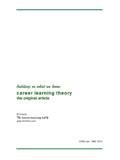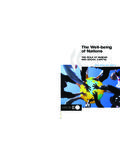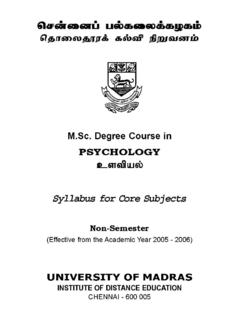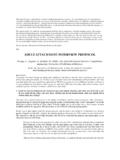Transcription of The Mediation of Learning in the Zone of Proximal ...
1 Thompson The Mediation of Learning in the Zone of Proximal Development 247 Research in the Teaching of English Volume 47, Number 3, February 2013 247 The Mediation of Learning in the Zone of Proximal Development through a Co-constructed Writing ActivityIan Thompson University of OxfordThis article develops a theoretical understanding of the processes involved in the co-construction of a written text by a teacher and student from a Vygotskian perspective. Drawing on cultural-historical and sociocultural theories of writing and Vygotsky s concept of the Zone of Proximal Development (ZPD), this case study of a student and teacher interaction in a UK secondary school examines the social Mediation of collaborative activity in the negotiation of meaning.
2 While expressivist process theories of writing focus on the development of the authentic voice of the writer, this article contends that the development of a student s writing abilities requires active intervention by a teacher within a constructed zone of development. Writing is viewed as a situated activity system that involves a dialectical tension between thought and the act of composition. Finally, the article will argue that the recursive and complex nature of writing development is an integral tool in the learner s own agency in creating a social environment for The premise for this paper is that writing is a complex form of social and cultural activity which involves a high level of abstraction as pupils attempt to commu-nicate meaning (Vygotsky, 1986, p.)
3 181). Vygotsky (1986) argues that the process of composition involves social and cultural interaction leading to the translation from inner speech, or internalized thought, to outer speech in the form of writ-ing. This change involves deliberate semantics deliberate structuring of the web of meaning that is unique to writing (Vygotsky 1986, p. 182). Britton, Burgess, Martin, McLeod, and Rosen (1975) describe this transformational process as the dialectical interrelationship of thought and language (p. 39). Writing therefore represents both a complex activity and a developmental mode of central theme in this paper will be the argument that the most powerful forms of Learning take place when students are working within a Zone of Proximal Development (ZPD), defined by Vygotsky (1978) 2472/1/13 3.
4 30 PM248 Research in the Teaching of English Volume 47 February 2013the distance between the actual developmental level as determined by independent problem solving and the level of potential development as determined through prob-lem solving under adult guidance or in collaboration with more capable peers. (p. 86) Vygotsky goes on to describe the ZPD as a tool through which the internal course of development can be understood (Vygotsky, 1978, p. 87) and argues that the only good kind of instruction is that which marches ahead of development and leads it; it must be aimed not so much at the ripe as at the ripening functions (Vygotsky, 1986, p.)
5 188). Yet as Moll (1990) points out, Vygotsky never specified the forms of social assistance to learners that constitute a ZPD beyond generalized comments about collaboration and direction (p. 11). This article examines both the mediating role of teachers in the development of a particular pupil s writing abilities and the consequent appropriation and internalization of the cultural tools required for writing. Through an analysis of the production of a text co-constructed between a student and teacher, an argument is developed that the recursive nature of writing development is an essential element for the learner s own agency in the creation of a social environment for development.
6 By developing a critique of Tharp and Gallimore s (1988) four stages model of the ZPD and assisted performance, this article also puts forward an argument that the key to understanding development of an individual s psychological and mental functions lies in analyzing the social interaction that the individual is involved in during the Learning process: that is, the immediate culture of teaching and ReviewMediation and WritingIn the context of school Learning , Vygotsky states that a child s development within a ZPD involves social interaction, dialogue, and mediated activity between learners and with their teachers (Vygotsky, 1978, 1986; Vygotsky & Luria, 1994).
7 As Wertsch (2007) argues, Mediation is a central theme throughout Vygotsky s writing:In his view, a hallmark of human consciousness is that it is associated with the use of tools, especially psychological tools or signs. Instead of acting in a direct, unmediated way in the social and physical world, our contact with the world is indirect or mediated by signs. This means that understanding the emergence and the definition of higher mental processes must be grounded in the notion of Mediation . (p. 178) Vygotsky distinguishes between the mediating functions of tools that are externally oriented and serve as the conductor of human influence on the ob-ject of activity and signs that are internally oriented and aimed at mastering oneself (Vygotsky, 1978, p.)
8 55). Sociocultural theorists ( , John-Steiner & Mahn, 2482/1/13 3:30 PMThompson The Mediation of Learning in the Zone of Proximal Development 2491996; Moll, 1990; Wertsch, 1985a, 1985b) and activity theorists ( , Cole, 1996; Engestr m, 2001) use the term cultural tool to refer to both physical tools ( , pen, computer) and psychological tools such as language. For example, Wertsch (2002) has made the claim that action and mind are fundamentally shaped both by the cultural tools and mediational means that individuals and groups employ (p. 105). Brown, Ash, Rutherford, Nakagawa, and Campione (1993) suggest that the active agents within the ZPD can include people, adults and children, with various degrees of expertise, but [they] can also include artifacts such as books, videos, wall displays, scientific equipment, and a computer environment intended to support intentional Learning (p.
9 191). Moll (2000) summarizes the centrality of Mediation to Learning as follows:To put it simply, human beings interact with their worlds primarily through mediational means; and these mediational means, the use of cultural artifacts, tools and symbols, including language, play crucial roles in the formation of human intellectual capaci-ties. (p. 257)When analyzing the process of students writing, it follows that as teachers and researchers we should play close attention to the ZPDs of students, the mediational tools that we provide to help scaffold their Learning development, and the range of social interaction and activities involved in the process of composing a written text, which include reading and writing, feeling and thinking, speaking and listening, observing and acting (Bazerman & Prior, 2004, p.
10 7).Vygotsky argues that human mental functioning is inherently social because it incorporates socially evolved and socially organized human tools (Wertsch & Tulviste, 1992, p. 551). Vygotsky (1981) states thatthe word social when applied to our subject has great significance. Above all, in the wid-est sense of the word, it means that everything that is cultural is social. Culture is the product of social life and human social activity. That is why just by raising the question of the cultural development of behavior we are directly introducing the social plane of development. (p. 164)Writing, in this sense of a situated social activity, can be seen as socially mediated activity through which a pupil develops the ability to deploy the psychological function of deliberate semantics deliberate structuring of the web of meaning (Vygotsky, 1986, p.

